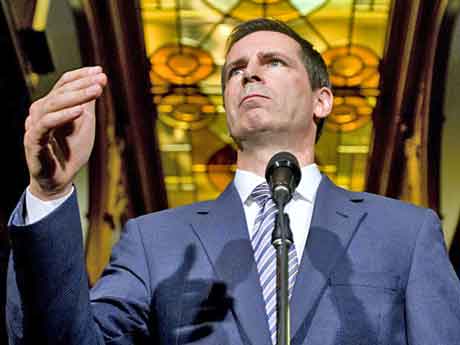In the News
Ontario leads country in new investments, equipment and technologies – McGuinty

By William Doyle-Marshall
Matching trading strides with China and India is a part of Premier Dalton McGuinty's four prong plan to make Ontario the home of the world's best workers making cutting edge products the world wants to buy.
He outlined his agenda to members of the ethnic media at a downtown session last week. The Premier stressed that his government is driving change in five big areas – education, healthcare, infrastructure, electricity and taxes.
His tax reform initiative is designed to acknowledge that Canada now has a high dollar and the country's single largest trading partner – the United States of America – is struggling. "Sleeping giants like China and India are now fully awake. We need to keep up with the competition," he advised.
Apart from the U.S., Greenland and parts of Africa, pretty well everyone in the world has taken on a value added tax like the HST, McGuinty observed. The reason for that action, the premier said, "it makes you stronger. It creates more jobs. It helps you better support your public services."
McGuinty said Ontario did not do this before because it's a hard thing to do. Referring to Plato's charge 'a life without criticism is not worth living' the Premier chuckled "so you might say I've been living life to the max".
He welcomed criticism because the government is doing the right things, he added. While boasting about having made Ontario a much better place for businesses to invest, Premier McGuinty reported this year a typical Ontario restaurant will pay 67% less in provincial, corporate sales tax ; savings for a software publisher are 58% and for a manufacturer – 89%. And because government has cut the cost of new business investment in the province by half, the Premier reported "our businesses are already responding by leading the country in new investments in equipment and technologies".
That action drives jobs, McGuinty said, which in turn helps families. "The first thing we did when we introduced our reforms was to take steps to protect families. That's why the average Ontario family is getting an income tax cut of $355 this year and every year going forward. Full day kindergarten is saving families thousands of dollars a year in daycare costs. And because we are now covering four more infant vaccinations, families are saving $1,200 per child," McGuinty continued.
While acknowledging the importance of immigration in Ontario's bid to compete with the rest of the world McGuinty said attracting the best workers with the right skills is key to the economic future but the federal government's cuts to settlement services for immigrants is holding back Ontario.
The Premier believed if Ontario had more control over services for new Canadians like Manitoba, British Columbia and Quebec, it could do more to help families reach their potential. He was mindful of the need to have a healthy workforce. "Healthy workers are productive workers. And a strong, public, health care system gives our workers and our businesses a real competitive advantage. That is why we are strengthening it. We're building 18 new hospitals. We have almost 11,000 more nurses and 2,900 more doctors," he continued.
According to Premier McGuinty the province has gone from zero to 200 family health teams serving 2.3 million patients. There are now nurse practitioner clinics and 94% of Ontarians have a family doctor. McGuinty quoted a recent national report that identifies Ontario as having the shortest wait time in the country.
With the federal government's health care funding up for renegotiation in 2014, the Premier insists that Ontarians want their federal and provincial governments to work together to improve medicare. They aren't looking for private care, they're looking for high quality care, he argues. Consequently, he believes Ontarians want the province to focus relentlessly on improvements to their publicly funded health care system. This means ensuring that Ottawa pays its share of the most important national programme.
The Premier said his government's plan to eliminate its deficit will be responsible and proven and would be based on its record. He informed the gathering that his government eliminated the previous government's deficit. Stressing the Liberal Government's values of protecting vital public service, he warned Ontarians that other parties would act recklessly in cutting taxes and public services alike.
He was certain that it is not possible to cut your way to strength. His government's remedy is to build and give people what they need to succeed. "We are giving Ontarians the education, health care, infrastructure, electricity and tax advantages they need to succeed today and in the future," the Premier promised.
Ontario – Aggelonitis

By William Doyle-Marshall
"Our government want to ensure that all seniors have the support that they need to continue to live with independence, in dignity, in good health and in safety,"Sophia Aggelonitis, Minister of Revenue and the Minister responsible for seniors made this disclosure while addressing the March meeting of the National Ethnic Press and Media Council of Canada.
In outlining a number of services geared for the province's seniors she announced that through the Ontario Seniors Secretariat government is working with many different multicultural agencies to develop and support culturally sensitive services and resources. The Diversity Toolkit was created to helps staff members who work in a seniors' setting and provide them with information and ideas for offering care and services with attention to individuals' cultural preferences; their belief system and their value system.
Elder abuse is a special problem for the province, the minister observed. There are numerous types of elder abuse that are very evident right now, the minister said. They include financial abuse, neglect, physical abuse, and mental abuse. While government has been addressing the matter in a number of ways Aggelonitis agreed that it's not enough. There is an organization called ONP (Ontario Network of Prevention for Elder Abuse, that run seminars on elder abuse and provide information on line as well.
The Ontario Government has already invested about $5 million from the Ontario Seniors Secretariat to help organizations to make sure they have services available for seniors who have experienced abuse.
Despite government efforts the minister was alarmed that for a very long time people seem to be embarrassed about the situation. Many don't want to talk about it, she observed. Stressing that elder abuse is a crime, the Minister responsible for Seniors urged any senior who is being abused must call -- 911 – the police.
In Ontario today, the minister said one in eight people is a senior, by 2031 the population would be one in five. By 2017 the seniors' population would be more than children 15 years and younger. "It is going to be the first time in Ontario's history that we will see that kind of demographic change. We also know that three million baby boomers in Ontario are starting to retire this year,"Aggelonitis added.
It basically means that a lot of significant changes are going to be happening in our province that will affect things like health care system, housing, transportation and accessibility.
A 24 hour, seven days a week Seniors Safety Line (1 866 299 1011) has been created in 154 languages. Any question people may have regarding seniors' services could be answered by staff on that line.
Aggelonitis' job as Minister of Revenue, is to ensure that Ontario seniors have the support they need to live financially stable and secure lives. Consequently she said a major change made in the tax system now makes it easier for Ontario families to be better off. Among the tax benefits that are specific for seniors are the Ontario Seniors Homeowners Property Tax Grant and the Ontario Energy and Property Tax Credit.
The tax grant is for seniors who own their home and are living in it. This helps them with their property tax..It has been increased to $500 double what it used to be. The Ontario Energy and Property Tax Credit helps with not only energy costs but also property tax. That is about $1,025 for seniors.
The new Ontario Clean Energy Benefit is a ten percent discount on hydro bills for the next five years. "We know that electricity costs are going up and the ten percent is a measure to help families with that transition," Aggelonitis emphasized
"These tax cuts and the tax credit will make things a little easier for our seniors around the province and that's why it is so very important that we ask people to file their taxes," the minister advised.
Many people don't file taxes because they feel they don't owe any money, however failure to file tax returns, the minister said, prevents government from ensuring those who qualify receive the tax cuts and credits due to them ."That's why it is vital for people to file their taxes," Aggelonitis added.
The Canadian Society of Immigration Consultants (CSIC) has taken legal action to halt the Federal government's proposal to replace CSIC with a new immigration consultant regulatory organization which it says "will require more than a million dollars of taxpayer dollars to get off the ground."
"It is astonishing that the Federal government has turned its back on consumers by choosing a new and inexperienced group, the Immigration Consultants of Canada Regulatory Council (ICCRC), to regulate immigration consultants. While CSIC has an impressive track record of consumer protection, the council has no relevant experience at all," said CSIC Chair Nigel Thomson.
"CSIC also has concerns that several of ICCRC's key founding members have been subject to disciplinary actions by CSIC and have filed lawsuits against CSIC in Federal Court."
In June 2010 the Federal government established criteria for the review of the national regulator of immigration consultants. In December CSIC made a submission to show that it met of the government's criteria for confirmation as the regulator.
"Consumers deserve effective protection now, and only CSIC has the policies, rules, expertise and infrastructure to provide that protection. The council will take years and millions of dollars to reach the same level of sophistication and in the meantime consumers will be put at risk," said Thomson. "CSIC believes that the process followed by the Federal government has been biased, unreasonable and unfair. This decision defies logic and CSIC is standing up for consumers by challenging the fairness of the selection process."
The Canadian Society of Immigration Consultants is the regulatory body for Certified Canadian Immigration Consultants. Established in 2004 it currently has 1,900 fully accredited members located throughout Canada and the world. A release from the body stated that "CSIC's mandate is to protect consumers of immigration consulting services. Consequently, it is responsible for ensuring the education, competency testing and the discipline of its members. CSIC also requires its members to carry errors and omissions insurance and to contribute to a compensation fund in order to protect consumers."